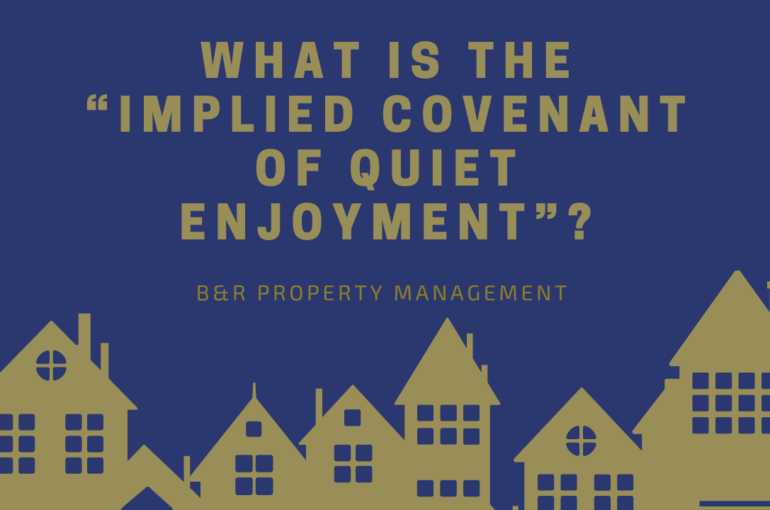What Is the “Implied Covenant of Quiet Enjoyment”
What Is the “Implied Covenant of Quiet Enjoyment”

For owners of rental units, having a solid understanding of landlord-tenant legislation is essential. Respecting local rental rules is essential to keeping a positive working relationship with your tenants, whether it’s the Fair Housing Act or security deposit regulations. It can also shield you from legal obligations.
“Implied covenant of quiet enjoyment” is a legal term that landlords need to understand. Tenants have certain fundamental rights, one of which is this. Not adhering to this might have legal repercussions as well as detrimental effects on your relationship with your tenants.
The professionals at B&R Property Management have created this guide to assist you in avoiding this. Let’s explore all the essential information on the implicit covenant of silent enjoyment!
What Is the “Implied Covenant of Quiet Enjoyment”?
The word “covenant” in law describes an implicit or explicit commitment to carry out or abstain from a particular course of action. Even in cases where it isn’t stated directly in a contract, the implicit covenant of quiet enjoyment is included in the majority of leasing agreements.
Even when it’s implied, landlords are not allowed to ask tenants to give up their right to peaceful enjoyment of the rental property.

The purpose of this implied covenant is to safeguard tenants’ right to live in a quiet and tranquil setting free from commotion or disruption from other tenants, the landlord, or even the neighbors. However, what exactly is meant by “quiet enjoyment”?
Well, this idea covers a number of rights, such as:
- Entitlement to tranquility: Tenants have the right to live without undue disturbances, whether from their landlord, neighbors, or fellow tenants.
- Privacy assurance: Tenants are entitled to complete privacy within their rented apartment. Landlords must provide prior notice before entering, except in emergencies.
- Timely maintenance guarantee: Landlords must maintain rental units in a safe, habitable condition, addressing maintenance concerns promptly to preserve tenants’ quality of life.
- Secure living environment: Tenants have the right to reside in secure premises. Landlords are obligated to provide basic security measures like functional locks, adequate outdoor lighting, and strong doors.
- Protection from harassment: Tenants have the right to be free from harassment by landlords, neighbors or fellow tenants. Harassment may provide grounds for early lease termination.
Some landlords include a specific covenant of peaceful enjoyment in their lease agreements, however this is not common. By demonstrating to your tenants that you are concerned about upholding their rights, you can foster a stronger rapport with them.

Providing information about your obligations and the rights of the tenant might help prevent misunderstandings and even legal issues.
Common Breaches of the Implied Covenant of Quiet Enjoyment
A tenant’s right to quiet enjoyment is not violated by showing up at their door to collect overdue rent or by going inside the rented property for an inspection or an emergency repair.
Neither do typical noises from neighbors and other tenants, nor does noise from wildlife. The following, however, are regarded as violations of the implied covenant of quiet enjoyment and may result in serious repercussions.
- Unauthorized Entrance: Except in cases of urgency, landlords are obligated by law in the majority of states to give at least 24 hours’ notice before visiting the property. It is your duty as a landlord to make every effort to abide by this regulation and get your tenant’s permission before making any changes to the property.
- Not Addressing Complaints: Tenants’ rights to live in a quiet and peaceful environment are safeguarded by the implicit covenant of quiet enjoyment. Tenants’ quality of life may suffer if noise concerns and disruptions go unaddressed. As such, landlords should always react to noise concerns in a timely and appropriate manner.

- No Upkeep: Tenants’ ability to peacefully enjoy a rental property may be interfered with if necessary repairs or maintenance are not performed on schedule. In order to be in compliance with the law and maintain the satisfaction of their tenants, landlords need to always maintain their properties.
- Failure to Maintain Common Areas: Landlords are typically responsible for maintaining common areas such as hallways, stairwells, and shared facilities. Neglecting to upkeep these areas can disrupt tenants’ peaceful enjoyment of the rental property.
- Environmental Hazards: Landlords must ensure that the rental property is free from environmental hazards that could affect tenants’ health or safety. This includes addressing issues such as mold, asbestos, lead paint, or pest infestations promptly and effectively.
- No Privacy: Tenants are entitled to privacy under the quiet enjoyment agreement. Landlords ought to uphold this right by safeguarding the data, time, and belongings of their tenants.
Bottom Line
Understanding landlord-tenant legislation is crucial for rental property owners to maintain positive relationships and legal compliance. The “Implied Covenant of Quiet Enjoyment” ensures tenants’ rights to peaceful habitation.
Landlords must respect tenants’ privacy, promptly address maintenance issues, and ensure a secure environment. Breaches include unauthorized entry, neglecting complaints or upkeep, and failing to maintain common areas or address environmental hazards.
Seeking assistance from professionals like B & R Property Management can help landlords navigate these complexities and maintain harmonious landlord-tenant relationships. Contact B & R Property Management today to learn how we can help you!



